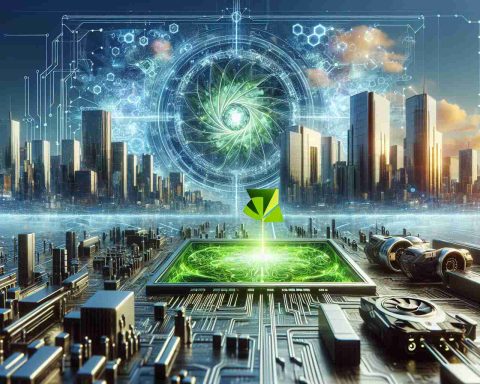Nvidia has emerged as a dominant force in the tech world, renowned for its superiority in supplying high-performance networking hardware and chips tailored for gaming, computing, and, most notably, data centres. These data centres are pivotal for the advancement of artificial intelligence (AI). Since debuting on the stock market in 1999, Nvidia’s market value has leapfrogged from a modest $500 million to a colossal $3.5 trillion, with a significant boost seen over the past two years due to the climbing demand for its AI-centric chips.
Currently, Nvidia’s stock is priced at $144.47, but analysts suggest it could ascend to $200 by 2025, potentially inflating the company’s valuation to nearly $4.9 trillion—a tempting 38% return for investors.
Game-Changing Blackwell Architecture
Nvidia’s GPUs, specifically built for parallel processing, are replacing traditional CPUs in handling AI tasks efficiently. Following the breakthrough Hopper architecture, Nvidia introduced the Blackwell-based GB200 NVL72 system, marking a remarkable advancement. This GPU system accelerates AI tasks 30 times faster than its predecessor and is 25 times more energy-efficient, paving the way for massive savings in data centre operations.
In its fiscal 2025 third quarter, Nvidia distributed 13,000 sample GB200 GPUs, and with supply unable to meet demand, rapid sales growth is anticipated. Forecasts suggest up to 800,000 units will ship in the early months of 2025, likely surpassing Hopper’s sales figures.
Valuation Potential Sparks Investor Interest
Nvidia’s high profit margins, driven by sky-high demand, have led to a tripling of earnings per share over the past year to $2.62. Despite the stock’s phenomenal rise, its price-to-earnings ratio remains favourable compared to historical figures, offering a potential bargain to investors. With expectations for earnings to increase to $4.43 per share by fiscal 2026, Nvidia may appear undervalued, hinting at significant stock appreciation prospects.
Nvidia presents a compelling investment opportunity, with dynamics positioning it for further growth as it continues to lead the AI revolution.
Why Nvidia’s Next-Gen Blackwell Architecture is a Game Changer
Introduction
Nvidia has solidified its status as a technology powerhouse, particularly in the realms of high-performance networking hardware and AI-driven data centre innovations. Renowned for crafting cutting-edge GPUs, Nvidia’s recent advancements with its Blackwell architecture promise to redefine the landscape of AI processing and investor expectations.
Innovative GPU Architecture: Blackwell
The introduction of Nvidia’s Blackwell-based GB200 NVL72 system marks a substantial leap forward in AI computing. Offering a 30-fold increase in processing speed compared to its predecessor, the Hopper architecture, Blackwell is engineered to manage AI tasks far more efficiently. The energy efficiency is another highlight, with the GPU being 25 times more energy-saving, leading to potentially significant cost reductions for data centre operations globally.
This innovation aligns with Nvidia’s strategy to replace traditional CPUs with specialized GPUs for AI tasks, setting the stage for broader adoption in both existing and new data centre infrastructures.
Market and Demand Dynamics
Nvidia’s strategy appears well-aligned with market demand, as evidenced by the quick distribution of 13,000 sample GB200 GPUs during its fiscal 2025 third quarter. Despite existing supply challenges, analysts project that sales may reach up to 800,000 units in early 2025, outperforming the earlier Hopper model. This surge underscores Nvidia’s capacity to meet burgeoning AI computational needs, reinforcing its market dominance.
Investor Opportunities and Market Valuation
Nvidia’s compelling market position and technological breakthroughs have engendered significant interest among investors. Even as its stock price has soared, the price-to-earnings ratio suggests it remains relatively undervalued, particularly with earnings projected to rise to $4.43 per share by fiscal 2026.
In light of these predictions, Nvidia’s valuation could surge from its current market value to potentially reaching nearly $4.9 trillion by 2025. This provides an alluring prospect for investors aiming for long-term growth associated with AI-driven innovation.
Sustainability and Energy Efficiency Advances
The energy efficiency of Nvidia’s Blackwell architecture is not only a financial advantage but also a critical component in global sustainability efforts. As the world grapples with increased energy demands, Nvidia’s focus on creating more energy-efficient processors could prove pivotal in reducing the carbon footprint of data centres worldwide.
Final Thoughts
Nvidia stands at the forefront of technological evolution, offering robust solutions to meet the growing demands of AI and high-performance computing. Whether investors, tech enthusiasts, or sustainability advocates, all stakeholders can see the value proposition in Nvidia’s groundbreaking developments and forward-thinking strategies.
For more information about Nvidia’s innovative technologies and ongoing developments, visit the official link name.




















